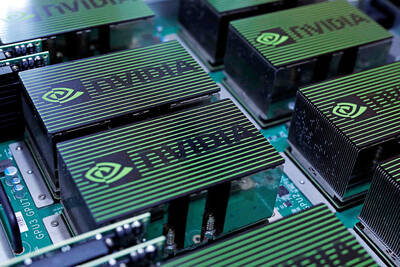Neo Solar Power Corp (新日光), the nation’s largest solar cell manufacturer, posted a slower monthly decline in revenue for last month, indicating the company’s efforts to alleviate the impact from a US anti-dumping case started paying off.
Revenue dropped 7.08 percent to NT$2.05 billion (US$68 million) last month, compared with NT$2.21 billion in June, according to a company statement released on Monday. The monthly decline in revenue shrank when compared with a monthly reduction of 15.82 percent in June.
“Since the US [Department of Commerce] announced the preliminary ruling on anti-dumping probes into Chinese firms in June, Neo Solar has began diversifying export destinations gradually and strengthening its customer portfolio,” Neo Solar said in a separate statement released on Monday.
“Revenues in June and July show that our efforts bore fruit,” the company said.
“Neo Solar will face less significant impact [from the levies] than most Taiwanese solar cell makers. We expect the impact will lessen month by month,” it added.
Taiwanese solar cell and module makers would be required to remit higher-than-expected anti-dumping tariffs between 27.58 percent and 44.18 percent on exports to the US if the ruling is finalized.
To minimize the potential impact of the levies, Neo Solar said it is also expanding its solar power system installation business via its General Energy Solutions Inc (永旺能源) subsidiary. General Energy is expected to sign solar installation contracts this year that could generate about NT$9 billion in revenue, Neo Solar said.
Additionally, Neo Solar is accelerating its overseas expansion and actively evaluating the possibility of building a plant in the US or other areas in Asia to supply its products to the US and other markets, the company statement said.
Separately, Green Energy Technology Inc (綠能科技), the nation’s largest solar wafer maker, yesterday posted a 10.9 percent growth in revenue for last month at NT$1.22 billion, compared with June’s NT$1.1 billion.
The company said it operated its factory at a 95 percent utilization rate last month, as it has over the past few months.
Green Energy expects average selling prices for the solar supply chain to fall in the short term, citing the reduced demand due to the proposed US tariffs.
The company emphasized that it does not face the anticipated levies and would not be significantly impacted by the determination.
However, Green Energy is evaluating the possibility of setting up a solar module production facility overseas to strengthen its partnership with clients, it said.

Leading Taiwanese bicycle brands Giant Manufacturing Co (巨大機械) and Merida Industry Co (美利達工業) on Sunday said that they have adopted measures to mitigate the impact of the tariff policies of US President Donald Trump’s administration. The US announced at the beginning of this month that it would impose a 20 percent tariff on imported goods made in Taiwan, effective on Thursday last week. The tariff would be added to other pre-existing most-favored-nation duties and industry-specific trade remedy levy, which would bring the overall tariff on Taiwan-made bicycles to between 25.5 percent and 31 percent. However, Giant did not seem too perturbed by the

AI SERVER DEMAND: ‘Overall industry demand continues to outpace supply and we are expanding capacity to meet it,’ the company’s chief executive officer said Hon Hai Precision Industry Co (鴻海精密) yesterday reported that net profit last quarter rose 27 percent from the same quarter last year on the back of demand for cloud services and high-performance computing products. Net profit surged to NT$44.36 billion (US$1.48 billion) from NT$35.04 billion a year earlier. On a quarterly basis, net profit grew 5 percent from NT$42.1 billion. Earnings per share expanded to NT$3.19 from NT$2.53 a year earlier and NT$3.03 in the first quarter. However, a sharp appreciation of the New Taiwan dollar since early May has weighed on the company’s performance, Hon Hai chief financial officer David Huang (黃德才)

UNPRECEDENTED DEAL: The arrangement which also includes AMD risks invalidating the national security rationale for US export controls, an expert said Nvidia Corp and Advanced Micro Devices Inc (AMD) have agreed to pay 15 percent of their revenue from Chinese artificial intelligence (AI) chip sales to the US government in a deal to secure export licenses, an unusual arrangement that might unnerve both US companies and Beijing. Nvidia plans to share 15 percent of the revenue from sales of its H20 AI accelerator in China, a person familiar with the matter said. AMD is to deliver the same share from MI308 revenue, the person added, asking for anonymity to discuss internal deliberations. The arrangement reflects US President Donald Trump’s consistent effort to engineer

NVIDIA FACTOR: Shipments of AI servers powered by GB300 chips would undergo pilot runs this quarter, with small shipments possibly starting next quarter, it said Quanta Computer Inc (廣達), which supplies artificial intelligence (AI) servers powered by Nvidia Corp chips, yesterday said that AI servers are on track to account for 70 percent of its total server revenue this year, thanks to improved yield rates and a better learning curve for Nvidia’s GB300 chip-based servers. AI servers accounted for more than 60 percent of its total server revenue in the first half of this year, Quanta chief financial officer Elton Yang (楊俊烈) told an online conference. The company’s latest production learning curve of the AI servers powered by Nvidia’s GB200 chips has improved after overcoming key component